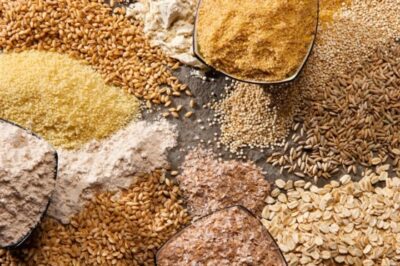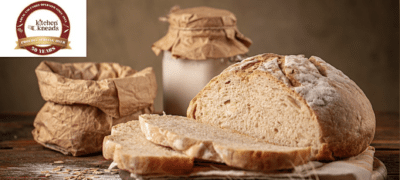

Grains are tricky. Oats can turn rancid very quickly due to their large amount of healthy fat. You need to ensure that they are well-cleaned and they are the most difficult grain to hull. Whether you opt for freshly rolled grains vs store-bought grains comes down to personal preference.
That said, freshly rolled grains preserve the natural vitamins, fats, and fibers found in whole grains. They have rich flavor and can be used in all sorts of baked goods. When rolled in their raw, natural state, they retain some of their “seed” shape. They soak up more liquid than their store-bought counterparts.
Rolled oats are husked, steamed oat berries that have been flattened and tenderized by rollers. Since they can go bad quickly, you must ensure that you store them properly. You can roll a bagful and freeze it until you are ready to use it.
You can use a grain flaking device or grain mill to make your own fresh rolled grains. You never want to use oats intended for livestock, as these are likely to have their hulls still intact. Since rolling your own grain isn’t a common practice, it may be difficult to find grain in its natural state.
Store-bought grains are refined. They are commercially steamed and flattened, toasted until the desired dryness is achieved. What this does is increase the shelf-life of the grains, so there is less worry about them going rancid. However, throughout this process, those good-for-you fats and natural enzymes are disabled in order to make the product shelf-stable and ready to use.
Ultimately, buying from the store is better for you if you don’t want to go out of your way to make grains and you don’t want to have to worry so much about the shelf life. However, fresh rolled grains are better for you in general, if you don’t mind the extra work.

You can grind your own flour as opposed to buying it at the store, but this may or may not be ideal for you, depending on flavor preferences and circumstances.
Fresh ground flour brings rich dimension to baked goods, layers of texture, and a lovely aroma. It has a richer flavor than store-bought flour, and may have increased nutrition.
Whole berries are typically cheaper than flour. Plus, you can keep berries indefinitely, then mill as needed, as opposed to flour’s 2-12 month shelf-life. There are different types of wheat berries, like soft white wheat which is good for things that don’t need strong gluten structure or hard white week for bread baking. You can store berries in the freezer wrapped in plastic in order to protect them from the accumulation of odors in the freezer.
There are many countertop electric mills available. The type you should get depends on your situation, such as how much flour to grind at a time, convenience, speed, fineness of flour, and the like. You can also grind other things into flour, like oats, lentils, and the like.
Freshly ground flour can be tricky. It spoils faster than store-bought flour. You can refrigerate it to help it last a little longer.
Fresh-ground flour also takes some getting used to. Not only does it taste different, but it doesn’t behave the same way as store-bought flour. There is a learning curve, and you cannot simply swap one for the other. It may overproof and tends to need more water since it absorbs more. It is more consistent.
However, you can rest assured knowing exactly what is in your flour. You can get more nutrients, like fatty acids and vitamin E, which may not be present in flour from the store.
At home, flour is typically milled in a single pass. Store-bought flour involves a longer process to ensure optimal bran, germ, and endosperm separation to produce types of flours, like whiter or darker. Flour from the store is typically aged for several weeks to oxidize, which allows for stronger, more elastic dough.
The quality of flour depends on the milling process, conditions grain grows in, size of production, and the like. On a mass scale, flour loses the majority of naturally occurring nutrients due to processing. This is to help it last longer on the shelves.

Again, it depends. Fresh flour tends to be better for you, but it can take adjusting to learn how to use it. Store-bought is easier to use and has a longer shelf life, but may not have good-for-you nutrients.
Kitchen Kneads is here to help you on your baking and cooking journey however we can. We provide appliances, ingredients, and even cooking classes. Contact us today to learn more about our products or classes.

Kitchen Kneads is your one-stop shop for quality grains, flour, kitchen appliances, and other ingredients.
We are Utah’s premier baking and cooking resource!
Questions?


Kitchen Kneads is your one stop shop for quality grains, flour, kitchen appliances and other ingredients. We are Utah’s premiere baking and cooking resource! Questions?
888-881-9957
info@kitchenkneads.com
2022 | Kitchen Kneads | All Rights Reserved | Privacy Policy | Terms | XML Sitemap | Site by PDM